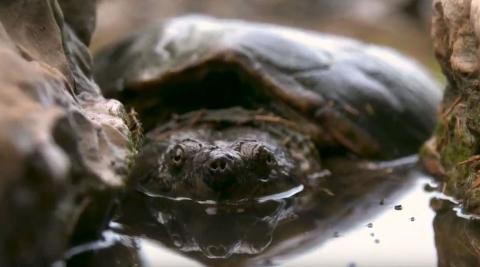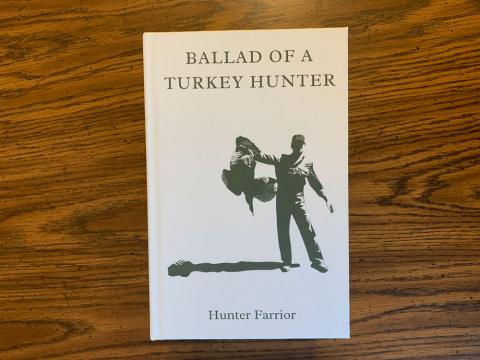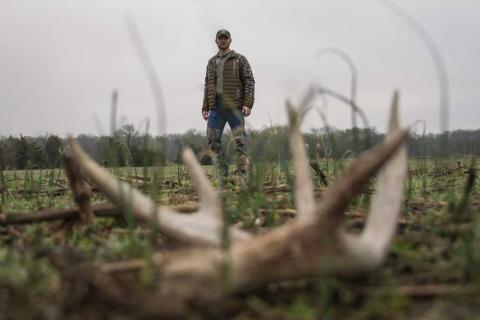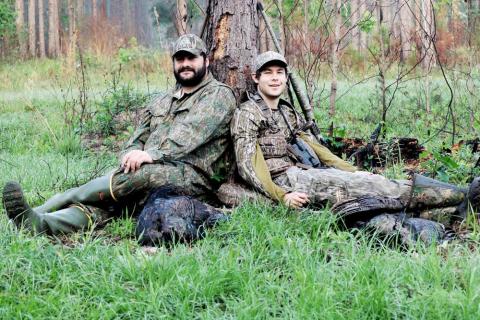Twenty-two-year-old Devlin Hodges of Kimberly, Alabama, the 2018 Alabama State Duck Calling Champion and avid waterfowler, also in 2018 set a school record at Samford University in Birmingham, Alabama, for single-season passing with 4,283 yards. He broke the all-time NCAA Division 1 football passing yards record set by Steve “Air” McNair. He’s been chosen for the Walter Camp Football Foundation All American Team and the HERO Sports All-American Team. Hodges is one of the top three candidates for the Walter Payton award as the best offensive player of 2018. Hodges plans to try out for the NFL Combine in February, where he’ll complete in both physical and mental tests for NFL coaches, general managers and scouts. Having finished his sports-administration degree, Hodges hopes to make the NFL and work in the outdoors field. Hodges is sold on Mossy Oak Bottomland camouflage and has worn that pattern since the beginning of his duck-hunting career at age 7, because he says that most of the time he’ll either be behind a tree or up against a tree.
Why Devlin Hodges Enjoys Calling Ducks and Football Plays
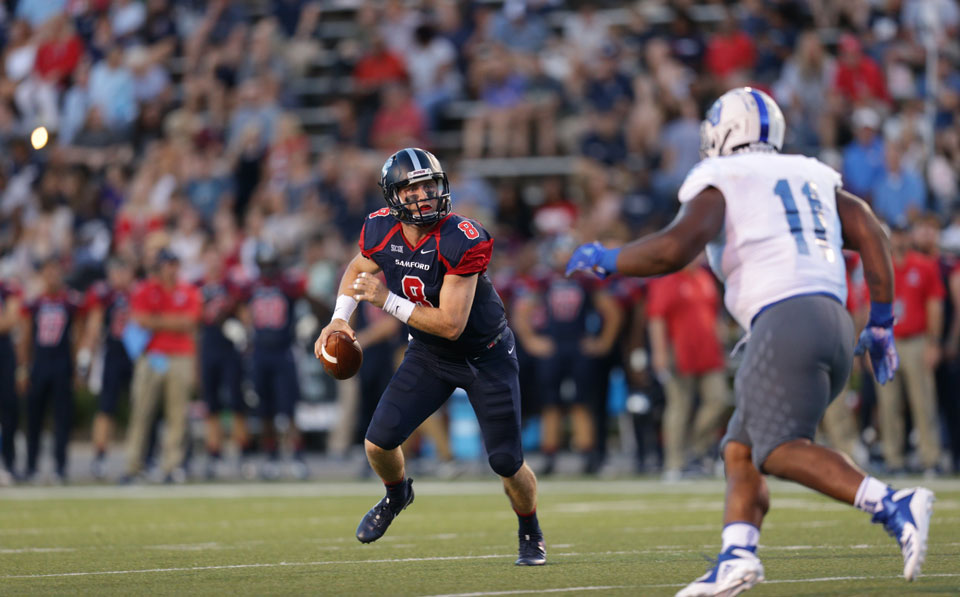
Sitting silently in the marsh, Hodges watched ducks as they approached his blind. After giving several hail calls, he looked to see if the ducks’ wing beats changed from the rhythm they had demonstrated before he called. Three of the ducks pulled some ways out of the group and acted like someone had thrown cold water on them. As the ducks continued to come closer, Hodges softened his calls and gave more quacks and feeding calls. Then the ducks flew right over where Hodges was hiding. But before they got out of hearing range, Hodges gave some fast, pleading calls, as if to say, “Y’all come on back. There’s plenty of good groceries down here to eat.”
When three ducks broke away from the flock, got down lower to the ground and flew over his blind, Hodges let them go past the decoys before hitting them with some more feeding calls and quacks. The ducks responded by dropping lower, turning and coming straight back toward Hodges’ decoys. Approaching the decoys, the ducks separated somewhat and cupped their wings to come in and light. As Hodges studied the birds, he could see all three. The mallard closest to the water he took first, but instead of watching the duck hit the water, he quickly swung his shotgun and dropped his second duck, while the hen mallard escaped without tasting his HEVI Shot.
On the Saturday afternoon of November 17, 2018, Hodges came to the line of the Samford Bulldogs football team from Birmingham and barked out signals. He had three wide outs and one tight end split out. When he yelled, “Hike,” the ball was snapped. The defensive linemen began to push, and the linebackers blitzed. Hodges checked his receivers to decide which one had the best chance of catching a pass, while being aware of three, 200-pound-plus defensive linemen driving hard toward him. Picking the most likely target, Hodges fired to one of the receivers, leading him like he’d led the ducks with his shotgun. His calculations were correct. The receiver caught the ball and went down, getting a first down. Hodges helped his team win this, his last, college football game on this day against East Tennessee State University.
As soon as the bus carrying the football players from the game arrived back on campus, Hodges jumped into his truck and drove to Arkansas to duck hunt on opening weekend from November 18–25. He traveled back to Birmingham and then returned to Arkansas on December 10 and hunted until December 21 before coming home for Christmas.
Does being a duck hunter require many of the same skills that being a proficient passing quarterback must have? Being able to see and identify ducks and receivers quickly has given Hodges more time to make decisions as to whether he’ll shoot or throw.
How Duck Hunting and Calling and Football Make Devlin Hodges a Three Sport Champion
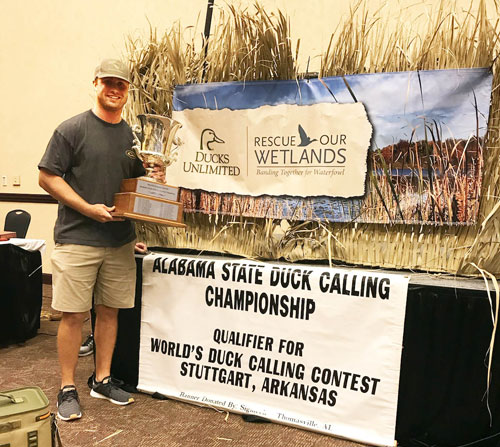 In 2018, Devlin Hodges won the Alabama State Duck Calling Contest. He’d won the 2009 Junior World Duck Calling Contest when he was 13 and finished in the top 5 in several other World’s Championship Duck Calling contests.
In 2018, Devlin Hodges won the Alabama State Duck Calling Contest. He’d won the 2009 Junior World Duck Calling Contest when he was 13 and finished in the top 5 in several other World’s Championship Duck Calling contests.
“In middle school and the first couple of years of high school, I was heavily into duck calling and practiced constantly,” Hodges explained. “But when I went to college, I couldn’t spend as much time on my duck calling because I had to dedicate more time to football and schoolwork. However, I definitely want to get back into duck calling and competing in duck calling contests when my football days are over.”
Hodges grew up like many southern young men, hunting white-tailed deer. But he remembered, “One of my dad’s hunting buddies said, ‘Y’all ought to try duck hunting.’ The tradition in my family was that everyone went deer hunting on Thanksgiving. But when I was about 7 years old, instead we went duck hunting. I think we killed one duck, but we all thought duck hunting was the coolest thing ever.”
Then when Hodges was 11, he went to a Ducks Unlimited banquet in Wetumpka. The youngsters at the banquet each received a goodie bag with all kinds of promotional products as well as a duck call. DU held a youth duck-calling contest, and Hodges won. He liked participating in duck-calling contests so much that he kept on calling until he became a master at talking duck.
Hodges began his duck-hunting career at Swan Creek WMA, north of Decatur, Alabama, on the Tennessee River. He took his first duck when he was 10 years old on a guided duck hunt in Arkansas. Devlin, his dad Zane Hodges, and his brother Duncan, who was younger and later played quarterback at the University of North Alabama in Florence, hunted at Swan Creek due to its proximity to their home.
“To get to Swan Creek WMA only required about 45 minutes or an hour of driving from where we lived,” Hodges said. “Swan Creek WMA had easy access to places we wanted to hunt.
“Later we met Johnny Oakes, who has become a good friend of our family. Today, we go to Oakes’ cabin in Arkansas and duck hunt quite a bit after football season ends. While I was playing football at Samford, the way our break in football at Samford worked out, we usually were finished with football by December 12, and we didn’t start back to school until January 23-24. So, I had a lot of free time to hunt ducks in Alabama and Arkansas. One of my best friends, Drew Sockwell, has some private land in north Alabama, where I go hunting when I’m not hunting in Arkansas.”
When Hodges visits Arkansas, he hunts public land only - mainly flooded timber.
“I like to hunt with groups of about five to six people,” Hodges said. “I don’t like to hunt with more than six, because hiding more than six people in flooded timber is tough. If you’re not hidden well and flare the ducks, then everybody loses.”
Hodges emphasizes that just because he’s hunting in Arkansas doesn’t mean he or his fellow hunters will take limits of ducks every time they go. “Sometimes everyone in our group will limit out when we’re hunting in Arkansas, and on some mornings, we’ll only get one to two ducks.”
Due to his championship-level football, Devlin Hodges was selected to be an instructor at the Manning Passing Academy, a four-day football clinic for many of the nation’s top college quarterbacks, who work out with Peyton and Eli Manning and then serve as counselors for about 1200 young men. In 2018, Hodges received a phone call from Archie Manning, famed Ole Miss and New Orleans Saints quarterback, and the father of Peyton and Eli, for the second time to instruct at the academy.
Devlin Hodges’ Duck Hunting and Calling Equipment
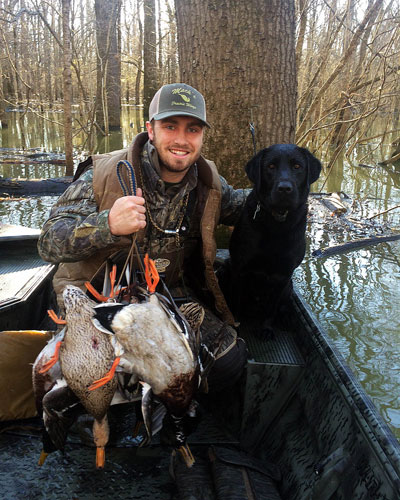 Devlin Hodges wears Mossy Oak Bottomland camouflage, because as he says, “Just like blue’s my favorite color for much of my regular clothing, the Bottomland pattern is my favorite camo and works well for camouflaging myself. And besides that, I think I look pretty good in it.”
Devlin Hodges wears Mossy Oak Bottomland camouflage, because as he says, “Just like blue’s my favorite color for much of my regular clothing, the Bottomland pattern is my favorite camo and works well for camouflaging myself. And besides that, I think I look pretty good in it.”
Through the years, Hodges has experimented with duck calls from several different duck call manufacturers. However, he currently uses a J.J. Lares Championship Call and recently got a Kirk McCullough Cut-Down Keyhole Duck Call.
“When I’m hunting in the timber, I like to be able to call a little bit louder than the other hunters I’m hunting with,” Hodges explains. “These two calls are somewhat louder than most calls that duck hunters use. Also, to me, they sound more ‘ducky’ than other calls do. I just feel more comfortable using those calls.”
Duck calls are to a duck hunter as personal and private as the shoes he wears and the underwear he chooses. Every duck caller has a specific reason why he blows the calls that he blows, and Hodges is no different.
“Now the duck calls I use in competitions aren’t made by either of those two companies,” Hodges said. “I use a Rich ‘N Tone MVP (maximum volume and performance) competition duck call. There’s a reason that I use this call in competition. Butch Richenback was the founder of Rich ‘N Tone Calls in 1976, after winning the 1972 World Championship of Duck Calling and the 1975 Championship of Champions Duck Calling Contest. For about 4-5 years before Butch passed away, we became very close friends. I felt like he looked upon me as though I was his son. He came to numerous baseball games that I played in, and he came to my graduation. When I first started duck calling, I’d go spend Thanksgiving week with Butch, and a week in the summer. The duck call - the MVP - that I won the 2018 Alabama State Duck Calling Contest with was the same Rich ‘N Tone duck call that I won the Junior Championship with in 2009.”
Hodges says he’s learned to call ducks while hunting primarily on his own. But credits Richenback with teaching him how to compete in duck-calling competitions.
Devlin Hodges’ Greatest Day of Duck Hunting
“My most memorable day of duck hunting was the last year I was young enough - 15 years old - to go on a youth hunt in my home state of Alabama,” Devlin Hodges said. “My dad and I went to Swan Creek WMA in north Alabama and hiked a mile or two, carrying all our decoys and duck hunting gear. Once we started setting out our decoys and getting ready to hunt, there were ducks everywhere. I remember harvesting three mallards, and we saw two black ducks flying. Black ducks weren’t common in the Swan Creek area back then. I finally shot one of those black ducks and kept my gun at the ready, as I waded out to pick him up. I didn’t know whether that black duck was down for good or not. I thought I might have to chase a second shot or chase the black duck in that shallow water.
“But as I drew closer, I spotted the black duck on his back with his feet in the air and a band on his leg. At that time, a banded duck was considered the biggest prize a young waterfowler ever could take. I was so excited I couldn’t stand myself. When I walked back to my dad, I was shaking so badly, that I dropped the duck. Once Dad looked at the duck, he had a big smile on his face and told me, ‘That duck’s not just banded. He’s double banded.’ One of the bands on that duck carried a $100 reward to the person turning in the band. Besides harvesting the double-banded, $100 black duck on that day, I finished out my limit of ducks too. As my dad and I walked back to our vehicle, we had deer come out of the woods and run along right beside us. I thought that was the coolest thing in the world.”
Something else that made this day so special for Devlin and his dad is that they had tried to get Devlin’s brother, Duncan, to go with them. Once Duncan decided not to go, Devlin told him, “Okay, I’ll kill a band for both of us.” As soon as Devlin saw the duck with the double bands, he couldn’t wait to return home and show Duncan the two-banded black duck.
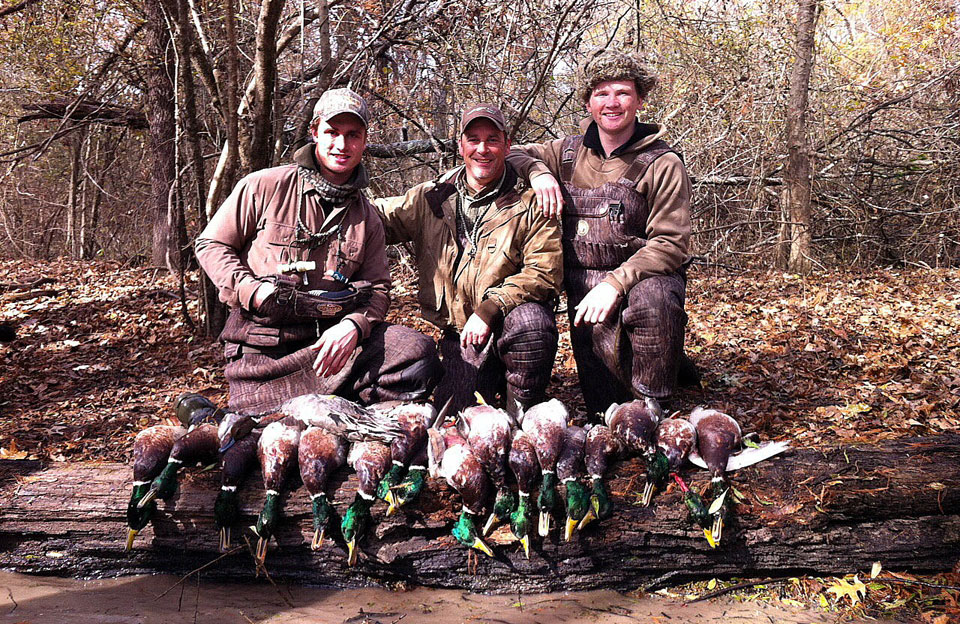
What’s Devlin Hodges’ Future for Hunting Ducks and Playing Football
When asked what his future held for 2019, he answered, “Going to Arkansas duck hunting, and then after that, I plan to train a lot, starting January 7, for the NFL Combine and get ready to try and play at the next level. However, I’m hoping to get some weekends off to return to Arkansas and hunt ducks, too. I’m not a guy who likes to constantly look ahead.”
Hodges is honest in his thoughts for the future. At 6’1” tall and weighing 205 pounds, Hodges realizes he has a long way to go and plenty to learn before he really decides what he wants to grow up to be. Hodges, like many great athletes, isn’t a one-trick pony.
“I played both baseball and football up until my senior year in high school, and then I started running track, because I thought track would get me in better shape for football than baseball would. I also love the sports of duck hunting and duck calling.”
Hodges ran the 4 x100 in high school, and his relay team placed third in the State of Alabama during track season.
When asked if he could look ahead and see himself in five years, and what he thinks he’ll be doing, he answered, “Hopefully I’ll be playing quarterback in the NFL. Of course, if I’m in the NFL, I won’t have very much time for duck hunting. I’ll also be buying my mother a house and trying to live each day as though it’s my last.”
















